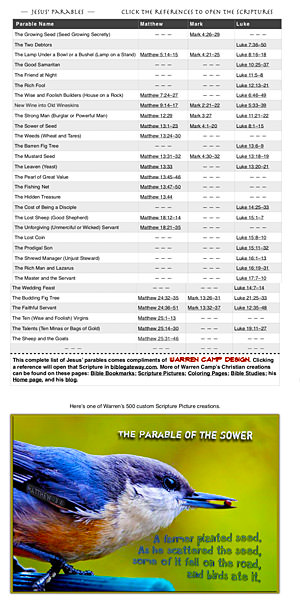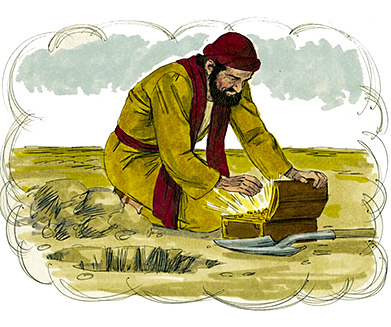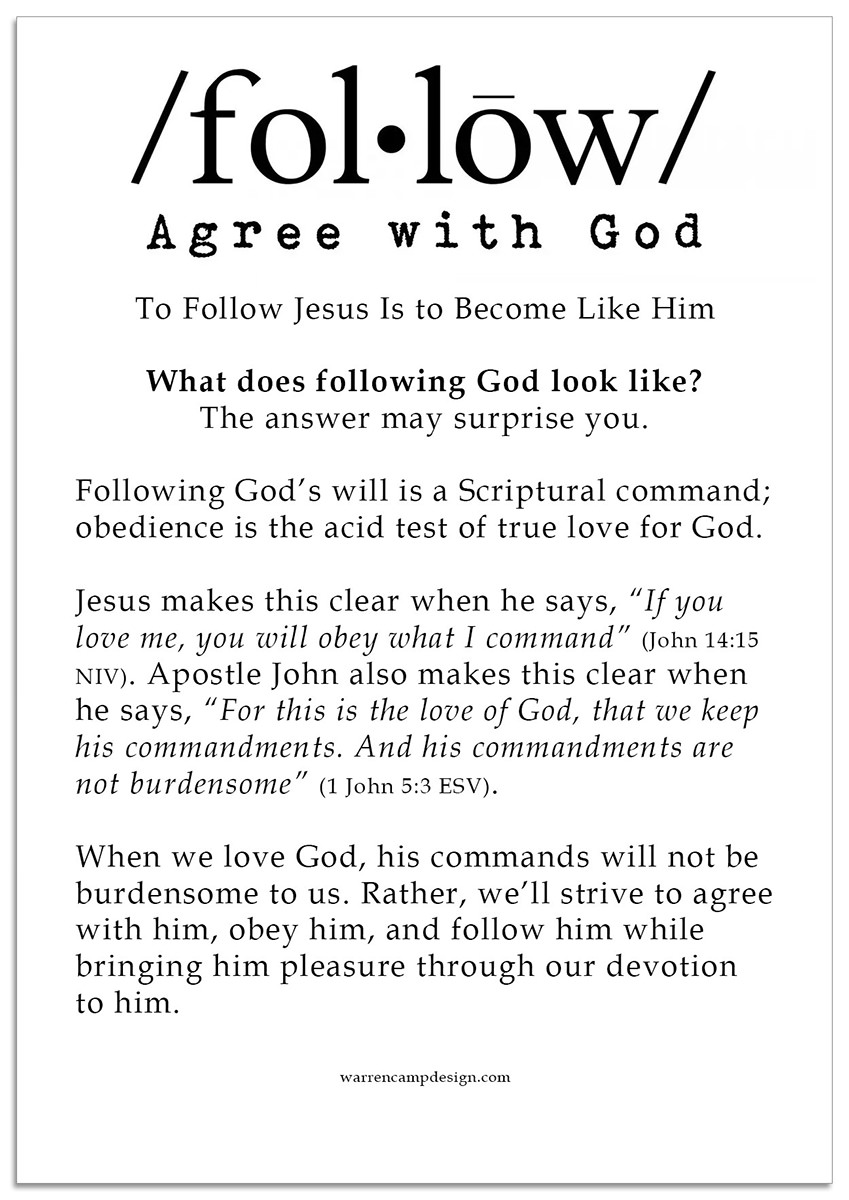
The kingdom of heaven is like treasure hidden in a field. When a man found it, he hid it again, and then in his joy went and sold all he had and bought that field.
Again, the kingdom of heaven is like a merchant looking for fine pearls. When he found one of great value, he went away and sold everything he had and bought it.

† Find Warren’s short summary at the bottom of page.

Click the list or the “bird” to enlarge and use Warren’s list of forty-four of Jesus’ parables (a PDF file with links to Scriptures).
Start Reading Warren’s Commentary . . .
Find his summary at the bottom.
par•a•ble [noun] a simple story used to illustrate the meaning of or a moral or spiritual lesson, as told by Jesus in the gospels
synonyms: allegory, moral story/tale, fable
Parables of the Hidden Treasure
and the Pearl of Great Value
Matthew 13:44–46
Jesus loved to use stories to illustrate profound, life-transforming concepts. In every parable, he used genuine settings, characters, and ideas that applied familiarly to his listeners, so that he could easily reveal to them God’s loving aims, endeavors, and plans. This combination of back-to-back miniparables is found only in Matthew’s gospel.
Both parables are obviously short and similar. Jesus employed Hebrew parallelism to emphasize his point. In both stories, a man finds something small or hidden that has great value. The main point of each miniparable is the contrast between the smallness and/or hiddenness of an object and its actual value.
This animated video comes compliments of Strong Hands Enterprises.
The Parables of the Hidden Treasure and the Pearl of Great Value
In Matthew’s account, Jesus told a parable that exemplifies God’s unending love for his children. He stands at the door of our heart and knocks, beckoning us with his loving-kindness, encouraging us to simply let him in and relate personally to him. He begins his parable by saying, “The kingdom of heaven is like. . .”
The Parables of the Hidden Treasure and the Pearl
44“The kingdom of heaven is like treasure hidden in a field. When a man found it, he hid it again, and then in his joy went and sold all he had and bought that field.
45“Again, the kingdom of heaven is like a merchant looking for fine pearls. 46When he found one of great value, he went away and sold everything he had and bought it” (Matt. 13:44–46).
The kingdom of God, which Matthew often refers to as “the kingdom of heaven,” is not a place. It’s a way of thinking, believing, and acting. Jesus taught people about the one and only true King of the universe who loves everyone. The King also wants everyone, no matter where they live or what they do, to follow him and live in his kingdom. In both parables, Jesus presents the kingdom of God as being a great treasure that has significant value. Relationship with Jesus, here on earth and eventually in heaven, is the most valuable element in our lives. Our wholehearted pursuit of him and his kingdom must become our greatest ambition!
Before we delve into the context and purpose of these two short and similar parables, realize their overview: When a man found a treasure, he hid it in a field, then sold everything he had to buy that field. Another man sold everything he had to buy a pearl of great value. Jesus said that the kingdom of God was like each of those concepts. When we meet Jesus personally, we should choose him to be our Lord and agree to do everything we can to follow him.
Background Matthew presents seven of Jesus’ parables in chapter 13. To a large crowd of interested people sitting by a lake, Jesus spoke the first few parables. When his closest disciples heard his Sower and Weeds parables and didn’t understand them, he made the effort to explain the parables to them when they were inside a house (13:36). As soon as he finished his explanation of them, he immediately told them the Hidden Treasure and Valuable Pearl Parables, as if to emphasize the importance of the preceding “kingdom” parables he’d told them that day.
While both parables are very similar, it’s wise to note at least one important difference. Many people have interpreted them as one and the same. However, the focus of what the kingdom of God represents appears to shift from the object of value (the hidden treasure) to the person searching (the merchant), giving the Hidden Treasure Parable a different focus and importance than the Pearl Parable. For that reason, I’ll separate both in my commentary.
The Parable of the Hidden Treasure
“The kingdom of heaven is like treasure hidden in a field. When a man found it, he hid it again, and then in his joy went and sold all he had and bought that field” (Matt. 13:44).
The man somehow stumbled upon a treasure. He didn’t own the field where he found it so he might have been working for someone, perhaps planting, farming, or constructing. Whatever he was doing, it must have been a wonderful surprise to have found a valuable treasure. Possibly, the treasure was a clay jar filled with gold, silver, or coins. In ancient times, no one put their money in a bank. Instead, people sometimes hid their valuables in buried jars to keep them safe from thieves. We see this approach in the Parable of the Talents (or Bags of Gold), where the man with one talent, fearful of losing it, buried it until the Master returned (Matthew 25:24–25). So, to have found treasure in the ground wouldn’t have been surprising to Jesus’ audience. Furthermore, the man wouldn’t have been considered unethical for covering it and purchasing the field. Jewish law stated, basically, whatever you find outside someone’s house is yours — finders keepers. Sadly, if a person who’d hidden a treasure died without telling anyone where it was buried, no one would ever know. This might have been the kind of treasure that the man in the parable had found.

As the story indicates, Jesus told his disciples that the kingdom of heaven was extremely valuable. When someone discovers God and his kingdom, realizing the treasure that he or she has found, he or she sells everything to obtain that treasure. Jesus made this point clear in his Parable of the Cost of Discipleship, which can be found in Luke 14:25–27. In essence, Jesus was saying that, those who realize the value of the kingdom of God are to give up or surrender their worldly attractions and ambitions, in order to attain God’s offering, despite the fact that the cost of acquiring admission into God’s kingdom is high.
Clearly, there was no doubt in the mind of this man that the treasure he’d found was worth as much as everything else that he owned. The Scripture says, “in his joy” he sold everything he had so he could buy the field. For those of us who are believers and followers of Jesus, when we realize the true value of our salvation, we’re to joyfully give up everything we have so we can serve God. All that we give up or surrender to him will amount to nothing in comparison to the magnitude of the treasure we’ll receive from God.
But what is this “treasure”? That’s this small parable’s big question. What could be worth so much that the man would sell everything he had and, in joy, buy the field that held such a treasure? In Matthew chapter 13, Jesus tells seven parables designed to explain the kingdom of God (or the kingdom of heaven, in Matthew’s words). In all of those parables, Jesus told his listeners (and us his readers), in no uncertain terms, that his kingdom is extremely valuable. Apparently, it’s also very accessible. The man who found the treasure didn’t travel far to discover it. He simply went about his day and, to his surprise, dug up his priceless treasure.
And what are we to make of the “field”? A field is something we often view casually and take for granted. We pass by them often, giving almost no thought to what’s inside them. The kingdom of God is like that. It’s always around. But it’s seldom on our minds and we don’t often talk about it or explore its possibilities. In all seven parables, Jesus brings the kingdom of God to mind, telling us what it’s like and how important it is.
However, those who aren’t willing to give up everything to pursue God’s kingdom and attain eternal life with Jesus, probably haven’t fully calculated its value. Eternal life has infinite value. Note, too, what Jesus told his disciples when they asked him, “Who then can be saved?” Jesus looked at them and said, “With man this is impossible, but with God all things are possible” (19:25–26).
The more one investigates this great heavenly treasure, the more he or she will understand and fully appreciate its worth and importance.
The Parable of the Pearl of Great Value
45“Again, the kingdom of heaven is like a merchant looking for fine pearls. 46When he found one of great value, he went away and sold everything he had and bought it” (Matt. 13:45–46).
In this Valuable Pearl Parable, the kingdom of heaven is compared to a merchant who was looking for fine pearls. When he found one of great value, he gave up everything he had to obtain such a priceless pearl. [See this illustration highlighting the extent that someone might give up everything he or she had to own something extremely valuable.]
Again, Jesus tells us what the kingdom of God is like. Here, it’s like a pearl merchant in search of fine, valuable pearls. When he found exceptional pearls, he’d buy them at a low price and sell them at a higher price to earn a living. The man was always looking for the finest pearls that would enable him to be most productive in his merchandising campaigns. One day, the pearl merchant found one pearl that was very valuable. It was the most beautiful pearl he’d ever seen. He had to have that pearl! So he sold everything he had so he’d have enough money to buy that pearl. Unlike the man who, to his surprise, found the hidden treasure as he was going about his work digging in the field, this merchant was seeking something valuable. He was on the hunt for it.

In many ways, this one is like the Hidden Treasure Parable. Both include men finding something worth more than everything they had. But their circumstances were different. Why does Jesus use these two men? One reason is because these parables show us two ways people find the kingdom of God. One way is totally surprising; the kingdom appears in a flash, unexpectedly. Another way is less surprising because the merchant had been looking for something valuable; he just had no idea he could find something so very valuable. Both approaches transformed the searchers’ lives.
Let’s look closely at what Jesus said in v. 45: “The kingdom of heaven is like a merchant looking for fine pearls.” The opening phrase, “The kingdom of heaven,” relates to Jesus’ kingdom; he’d revealed that earlier in 13:41. Further, the “merchant” represents God who searches continually for valuable items. And, since Jesus Christ is God, he was speaking of himself as the merchant. The “fine pearl” is that valuable commodity who, when personified, follows Jesus, repents, surrenders to him, and serves and obeys him.
Jesus, the “merchant,” upon finding a valuable follower (the “pearl”), gave up everything to obtain it. Jesus lived out this parable by sacrificing himself in order to relate personally with many followers or “pearls of great value.” In John 3:16, you can clearly see how God “sold everything he had” so that he could buy that valuable possession: “For God so loved the world that he gave his only Son, so that everyone who believes in him may not perish but may have eternal life.”
The kingdom of God is unlike any this world has ever seen. It’s present now as it’s been for all of time. Its ordinariness might cause us to overlook it: We miss the treasure in the field, simply because we’d never imagine we could find God there; and we go looking for pearls of great value, never dreaming something of such great value exists. God’s kingdom is the only kingdom that has no admission charge or test, and no entrance fee. Every other religion’s god says, “This is the way to find gain: Work toward it.” Jesus alone says, “I am the way, come to me.” And when we come to Jesus as our Lord, like the man in the field and the merchant in the marketplace, we gladly leave what we have because of what and who he is.
A Hearty Way to Apply These Parables Today
When we find a treasure like God’s kingdom, the cost to follow him becomes insignificant. This means that both parables — in fact all seven parables in chapter 13 — aren’t so much about what we’re willing to give up, in order to gain access to God’s kingdom, but that our gaining the kingdom is worth our losing everything in this earthly kingdom.
The kingdom of God costs you everything because, when you find it, you can’t continue to be the person you once were. Your life will change radically. What you love will be altered. You’ll have a different purpose in life. What a wonderful reality that is!
God’s kingdom costs you nothing to gain entrance because Jesus paid the admission price. He gave you the right to be called a child of God (John 1:12). Because of him, it’s your Father’s good pleasure to give the kingdom directly to you (Luke 12:32).
While it costs you nothing to access the kingdom, to receive the kingdom costs you everything. It’s a happy trade-off. Everything we’ve ever longed for is inside his kingdom. “In his joy, he goes and sells all that he has and buys that field” and “when he found one of great value, he went away and sold everything he had and bought it.”
Turning from interpretation to application, three important questions that unpack and apply both parables need to be asked — each of which are answered by Apostle Paul. How do you answer each personal question?
- Why do some people recognize the value of God’s kingdom while others don’t? (See how Apostle Paul answers this in 1 Timothy 2:1–4.)
- What happens to your view of your other “treasures” when you discover the value of God’s kingdom? (Paul’s answer: Philippians 3:7–9.)
- How do you say “Thank you” to God for giving his children this precious gift of his kingdom? (Paul says this in Romans 12:1–2.)
“When he found one of great value, he went away and sold everything he had and bought it”
(Matt. 13:46).

Take Warren’s “Parables Quiz.”
Find his other “Parables of Jesus” commentaries.
— Warren’s Concise Summary —
The Miniparables of the Hidden Treasure and the Valuable Pearl, found in Matt. 13:44–46, both illustrate the incomparable worth of the Kingdom of Heaven.
In the first miniparable, a man stumbles upon a hidden treasure in a field and, recognizing its immense value, joyfully sells all he owns to buy the field and claim the treasure. In the second, a merchant actively seeking fine pearls discovers one of extraordinary value and likewise sells everything to acquire it.
Both parables emphasize that the Kingdom is so precious that it’s worth sacrificing all else to obtain; whether discovered unexpectedly or sought after diligently, its surpassing value demands a wholehearted, joyful commitment, surpassing all other earthly pursuits or possessions.


